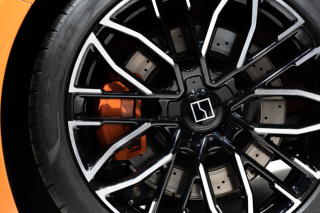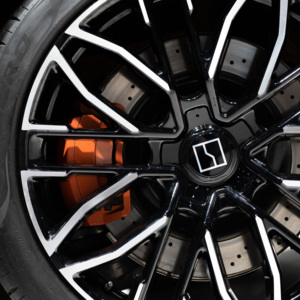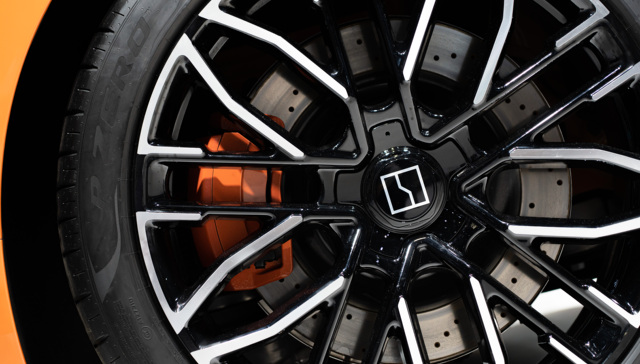By ZHOU Shuqi
Chinese EV maker Zeekr has permission from the China Securities Regulatory Commission for an IPO in the United States to raise about US$1 billion (7 billion yuan) and began its roadshow three weeks ago.
Zeekr is one of the EV marques of Geely, which also owns Volvo and Lotus. Zeekr is focused on overseas investors and has held meetings with investment institutions in Singapore and Europe, aiming for a valuation of US$18 billion. This is comparable to Nio's current market capitalization on the US stock market, which recently reached US$18.3 billion.
Shifting relationships
While most industry insiders are optimistic about Zeekr’s IPO plan, few of them think the EV maker will reach that valuation. Another EV startup Xpeng, which recently got a major injection from Volkswagen, has only reached a valuation of US billion after rounds of stock price surges. Zeekr’s valuation stood at US billion in February after it finished Series Pre-A financing.

The current US listing environment and capital market are vastly different from the days when Nio and Xpeng made their debuts and enthusiasm for EVs has cooled.
Sino-American capital cooperation saw a shift at the end of 2020. Due to intensified regulatory scrutiny, high inflation, and rising interest rates, Chinese companies' appeal has sharply declined over the past two years.
Meanwhile in China, about one out of every three cars sold is an EV. Apart from Tesla, all other best-selling models are Chinese.
EVs hit hard by US economy
Traditional Chinese automakers are incubating entirely new electric marques, engaging in competition with a startup mentality, a sense of urgency, and talent structures similar to tech companies.
These new energy sub-brands also hope to gain favor with investors. This not only ensures that they have sufficient funds to cope with subsequent market competition but also reduces the cost burden on parent companies.
After the fervor for EV startups peaked in 2021, the US Federal Reserve has raised interest rates to combat inflation, significantly raising financing costs. Wall Street's new stock issuances, bond financing, and company mergers have all slowed to a near standstill.
While the rise in funding costs is also impacting speculative enterprises in other fields, capital-intensive electric vehicle startups are hit hard.
Expansion not going well
Establishing a new car manufacturing company requires a large upfront investment, and it may take several years before profitability is possible. In an era of abundant hot money, investors were willing to pay a premium for the risky, high returns in the distant future, but those days are gone.
Industry insiders, lawyers, and investors believe that, although there are signs of recovery this year, with the market gradually rebounding, the US IPO market is unlikely to return to the levels of 2020. Startups need to readjust to the new investor mindset, which emphasizes profitability rather than growth.
GUI Lingfeng, director of Kearney Consulting, told Jiemian News that, for Chinese EV companies, the US capital market currently remains cautious.
"Zeekr's expansion in Europe is not going that well, especially in the German-speaking region. The core purpose is to quickly raise their profile in front of overseas investors. From this perspective, they are aware that overseas investors are more conservative about their own business models and products and future forecasts," said Gui.
Not a real automaker
Investors still view Zeekr as a technology company, not an automaker, so typically use a valuation based on a two to three times price-to-sales (PS) ratio.
The price-to-sales ratio is commonly used to assess the valuation of early-stage, high-growth startups that have not yet achieved profitability. It indicates how much investors are willing to pay for every dollar of revenue generated by the company.
The median PS ratio for US-listed automotive companies is 0.81. Traditional automakers Toyota, Honda, Stellantis, and Geely, the parent company of Zeekr, all have PS ratios below one.
For Zeekr and other EV startups that have not turned a profit, investor evaluation is based, not on car sales, but to a large extent on the potential for higher-margin software fees, technology exports, and imaginative prospects in the autonomous driving market.
Much more money required
What sets Zeekr apart is that it spun off from a traditional automaker, seeking an independent listing. The capital market favors new brands that are completely independent and unburdened.
Backed by Geely, Zeekr will share development expenses and capital expenditures with other brands under the Geely umbrella. This is an extremely advantageous factor. Geely Group has the highest number of subsidiary brands of any automotive company globally.
If Zeekr chooses to postpone its IPO for one or two years, the likelihood of obtaining larger financing amounts and valuations may increase. Industry insiders believe that as the Federal Reserve begins to lower interest rates again in the next 1 to 2 years, it will boost activity in the stock market. From a market fundamentals perspective, stock market volatility is decreasing, inflation is easing, and investors are returning to speculative bets.
In the first half of this year, Zeekr's net loss reached 809 million yuan, expanding from 759 million yuan in the same period last year, and Zeekr needs to continue to make capital investments.
Reduce costs, increase efficiency, make profit
The call from within Geely for Zeekr to bear its own funding and operate independently is growing. Global rating agencies Standard & Poor's and Moody's have adjusted the credit outlook of Geely Holdings and Geely Automotive from stable to negative.
In the period of market silence, many startups have been forced to do things in the past two years that seemed unimaginable: reduce costs, increase efficiency, and make a profit. Those that failed to receive external financing saw cash reserves diminish, leading to closure or acquisition.
Zeekr's sales of 70,000 for a single model last year are enough to tell the capital market what comes next. When Li Auto went public in 2020, annual deliveries were only 32,600.
Geely's years of experience dealing with foreign investment have laid the foundation for Zeekr. In 2010, Geely acquired Volvo from Ford. Since then, Geely Chairman LI Shufu's portfolio has included a stake in Aston Martin and dominant equity interests in EV startups such as Polestar and Lotus Technology.
Friends in high places
Li has taken several of his companies public over the past two years. In 2021, Volvo conducted an IPO on the Stockholm Stock Exchange in Sweden, with Polestar and Ganfeng Lithium listing on NASDAQ. Lotus Technology plans to go public in the US via a Special Purpose Acquisition Company (SPAC) merger.
Institutions involved in these listings are likely to appear on Zeekr's investor list. Benefiting from close contacts with both the parent company and global investment institutions, when negotiating with foreign investors, Zeekr at the very least does not need to introduce itself.
Investor concerns about Zeekr lie in how it can sell 650,000 vehicles by 2025 while ensuring its independence. In terms of investment, platform sharing, and the supply of scarce components such as semiconductors and batteries, conflicts of interest will inevitably arise between Zeekr and Geely's other high-end electric vehicle brands.
Nothing to choose between them
Zeekr, Volvo, Polestar, Lotus Technology, as well as Geely and Baidu's jointly launched Ji Yue, are all competing for the same customers, and some of the models they develop are based on the same SEA platform, with some even produced on the same assembly line
According to the Wall Street Journal, Geely’s listing of subsidiaries, rather than the holding company itself, may make governance even more difficult. Any hint that Li is favoring one child over another would be critical for minority shareholders.





